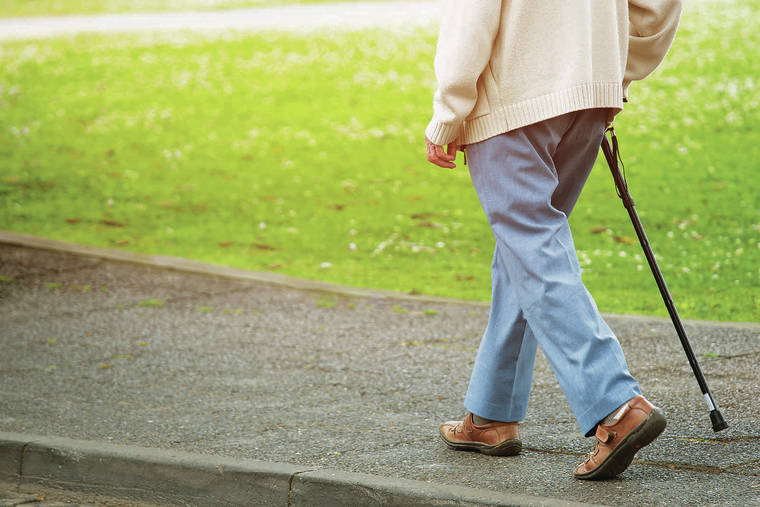How to regain your game after COVID isolation
[ad_1]
Alice Herb, 88, an intrepid New Yorker, is used to walking miles around Manhattan. But after that year of being incarcerated to avoid COVID-19, she has noticed a huge difference in how she feels.
“Physically, I’m out of shape,” she said. “The other day I took the subway for the first time and was out of breath when I climbed two flights of stairs to the street. I’m just not. “
Emotionally, Herb, a retired lawyer and journalist, is unusually reluctant to resume activities despite being fully vaccinated.
“You ask yourself: what if something happens? Maybe I shouldn’t do that. Maybe that’s dangerous, â€she said.
Failure to address issues that have emerged during the pandemic – muscle weakness, poor diet, insomnia, anxiety, social isolation, and more – can lead to poorer health and increased frailty, experts warn.
What should people do to meet such challenges? Experts gave advice:
>> Reconnect to your doctor: Many seniors delayed medical care during the pandemic. Now that most are vaccinated, it’s time to schedule visits to general practitioners and checkups like mammograms, teeth cleanings, eye exams, and hearing tests, said Dr. Robert MacArthur, Chief Medical Officer of the Commonwealth Care Alliance in Massachusetts.
>> Have your functionality assessed: According to Dr. Jonathan Bean, an expert in geriatric rehabilitation and director of the New England Geriatric Research, Education and Clinical Center of the Veterans Affairs Boston Healthcare System, visits to primary care should include a basic physical performance assessment.
>> Get a referral for therapy: If you have trouble moving or doing things you used to do, see a physical or occupational therapist.
A physical therapist can work with you on strength, balance, freedom of movement, and endurance. An occupational therapist can help you change the way you perform various tasks, check your home for safety, and identify improvements that need to be made, such as:
>> Start slowly and build up steadily: Be realistic about your current skills. “In my experience, older adults are eager to leave the house and do what they did a year ago,” said Dr. John Batsis, Associate Professor of Geriatrics at the University of North Carolina at Chapel Hill. “But … you can’t do that.”
Nina DePaola, vice president of post-acute services at Northwell Health, the largest healthcare system in New York, agreed. “Move,” she said. “Listen to your body. Do not do anything that causes discomfort or pain. Imagine yourself in a thoughtful and measured way in new surroundings. “
>> Be physically active: Engage in regular physical activity of any kind. The Go4Life program, sponsored by the National Institute on Aging, is a valuable resource for beginners. You can find videos on YouTube with some sample exercise routines. In addition, like many senior centers, the YMCA has put exercise courses online. For veterans, the VA has Gerofit, a virtual group exercise program that is worth trying out.
Bienvenido Manzano, 70, from Boston, who left the Coast Guard after 24 years and has significant back pain, attends gerofit courses three times a week. “This program strengthens your muscles and involves every part of your body, and it’s a great help,” he said.
>> Eat well: Eat a balanced diet that is high in protein. A recent study found that adequate protein intake is even more important for older adults during times of stress or when they are sedentary and not moving around a lot.
>> Restore routines: “For older adults, it is important to have a daily structure that includes social interactions, whether virtual or in person, and various activities, including spending time outside in good weather,” said Dr. Lauren Beth Gerlach, geriatric psychiatrist and assistant professor of psychiatry at the University of Michigan.
End of the day routines are also useful for addressing sleep issues, which have become more common during the pandemic.
>> Reconnect socially: Mental health problems have also worsened in some older adults, according to a University of Michigan survey: 19% said they had more sadness or depression, while 28% said they were more anxious or worried.
Social isolation and loneliness can add to these feelings, and it’s a good idea to “support social welfare” and see other people in person if you’re vaccinated, Gerlach said.
Families play an important role in reconnecting loved ones with the world, Batsis said. “They had about 15 months with only a few face-to-face interactions. Do it now by coming over more often. “
———
Kaiser Health News is a national newsroom that produces in-depth journalism on health topics. It is an editorially independent program of the Henry J. Kaiser Family Foundation. It is not affiliated with Kaiser Permanente.
[ad_2]

